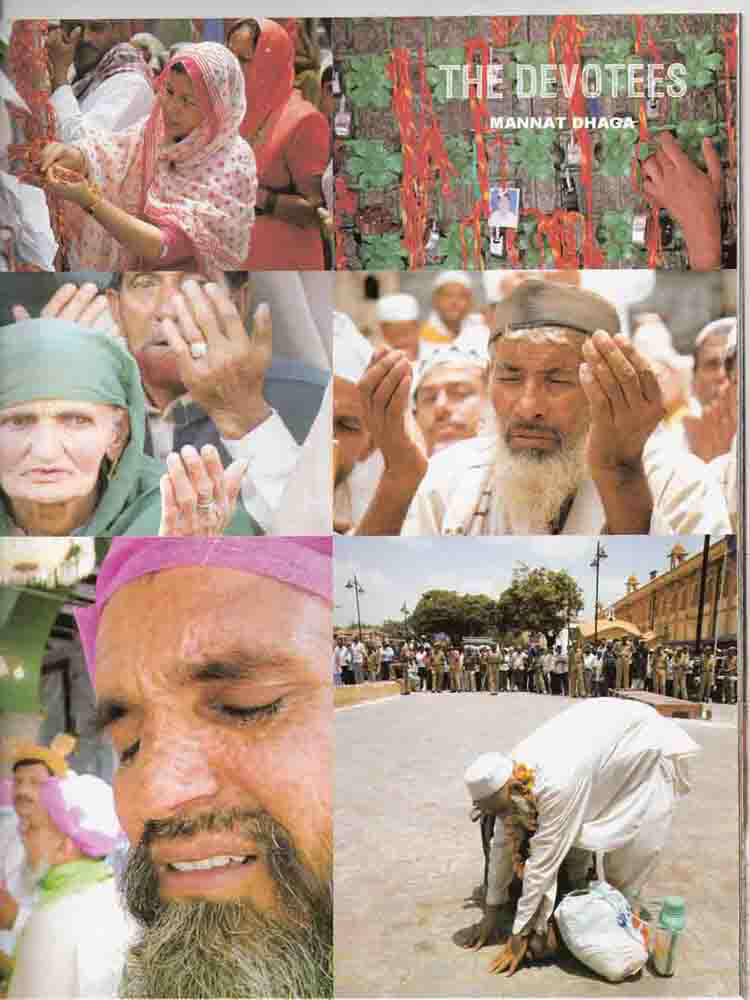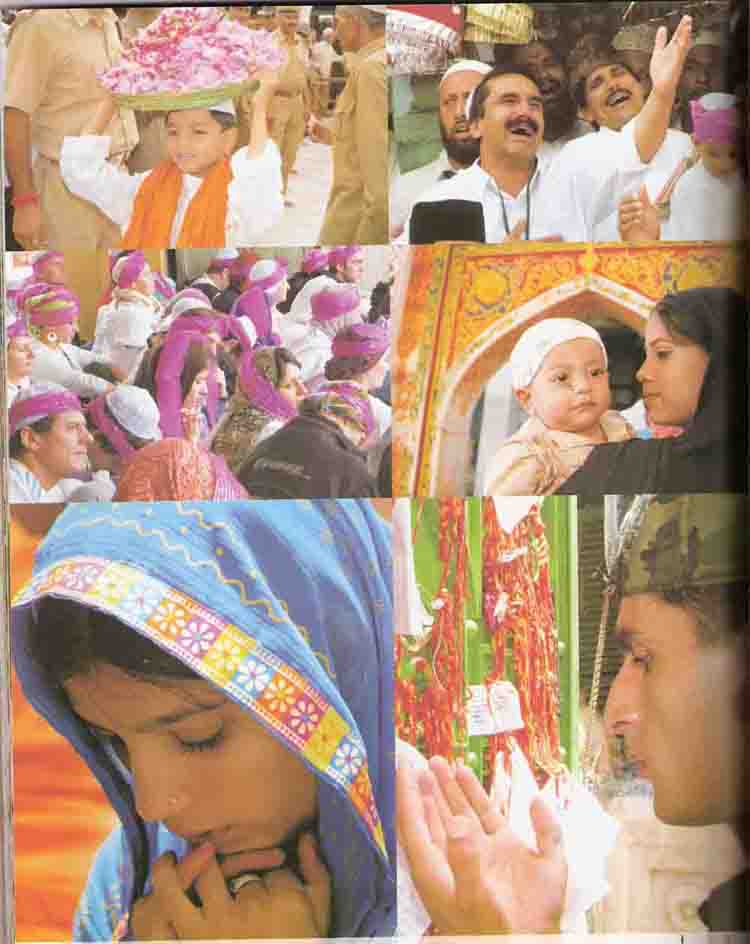|
Mannat Dargah
Ajmer Sharif
+919829270093
Ajmer Sharif Dargah Mannat
.jpg)
Dargah Mannat Ajmer Sharif India
 
Ajmer Sharif MANNAT
BY HAJI SYED SHAHNAWAZ CHISHTY (SHAH SAHEB)
INTRODUCTION
Ajmer Sharif Dargah Mannat of Khwaja ji Garib Nawaz Ajmer Sharif Mannat wish
Rajasthan, India
The main gate to the shrine is the Nizam Gate, following which is Shahjahani
Gate which was erected by Mughal emperor, Shah Jahan. It is followed by Buland
Darwaza, upon which the Urs flag is hoisted,marking the beginning of the
festival.
The shrine had become one of the most important centers for the diffusion of
composite culture that had struck deep roots in the psyche of both the Hindus
and Muslim. Thus the result of the long association of the Hindus with the
shrine can be assessed from the customs at the Dargah by the Muslims and Hindus
alike. For example putting Lachcha (red and yellow threads) around the neck or
hand of the devotees, pasting of sandal at mazar and tying of threads at shrine
as a mark of vows (mannat), cracking of coconuts at the door steps of Dargah,
and the lighting ceremony at dust etc are symbolic of the emerging of composite
culture.
NAZAR NIAZ
In the present advanced age several questions are being raised in relation to
those offerings which are made at the shrines of Muslim saints, particularly at
the Dargah of Hazrat Khwaja Gharib Nawaz (R.A.) at ajmer.
It is all due to the lack of proper religious knowledge, lack of well
established customs precedents and traditions and lack of settled Islamic and
judicial pronouncements on this point Nazar-O-Niaz which is a combination of two
words of Arabic language, in English it means vows and oblations. The Hadeeth
literature indicates that the Ahlul Bayt (A.S) showed the importance of Nazr by
their acts more than once. The following story is recorded in many tafseer books
about the revelation of these verses of sura Dahr.
Once the Imam Hasan and Imam Hussain, who were at that time 5 and 4 years old,
fell ill. When the Prophet of Islam, missed them in the mosque, he came to
Hazrat Fatima Zahra's house to inquire about them. When he was told that they
were sick, he suggested that both parents should take a spiritual vow (Nazr) for
the children's recovery. So both Imam Ali and Fatima Zahra prayed to Allah for
the recovery of Hasan and Husayn (peace be unto them all) and took a vow to fast
for three consecutive days when the children became well again. The children did
recover from the illness soon after. Both parents set about fulfilling their
spiritual vow and fasted. When the children saw that, they also decided to fast
with their parents and so did the house-maid, Fiddha.
But that day there was no food in Fatima's house even for breaking the fast. So
Imam Ali went out looking for work. He could not find any. But he was able to
get three kg's of wool to be spun in exchange of three kg's of barley. Fatima
Zahra spun the wool all day. She was only able to dispense with one kilo of it.
So she took only one kilo of barley ground it into flour and prepared five
loaves of bread. While they were all ready to break their fast, someone knocked
at the door saying: "O people of the house of the Prophet, I am a poor man and I
have nothing to eat, is there anything you could do to feed me." At this Imam
Ali stood up, went to the door and gave his loaf to the man. Fatima Zahra did
the same. Watching this, both children also gave their loaves and so did the
maid. They broke their fast by water and retired.
The next day Fatima Zahra spun another kilo of wool. So she separated one kilo
of barley, ground it into flour and prepared five loaves once again. As they
were ready to break their fast, once again, a voice called out from the door: "O
people of the house of The Prophet, I am an orphan, I am hungry, could you feed
me?" Hearing this, Imam Ali stood up and gave his loaf to the man, so did Fatima
Zahra, the children and the maid.
They all, once again, broke their fast by water and retired. Came the third day,
Fatima Zahra spun the rest of the wool, took the remaining barley, ground it
into flour and prepared five loaves. As they were ready to break the fast, a
voice called from the door saying: "O people of the house of the Prophet, I am a
prisoner, I am hungry, could you feed me?" Hearing this, once again, Imam Ali
stood up and went to the door and gave his loaf away to the prisoner. Fatima
Zahra, the children and the maid did likewise. Every time the person at the door
would want to express his gratitude for the kindness, Imam Ali would say: "No,
no, we are not looking for any reward from you for this act, we are doing it out
of Allah's love."
Firstly a Devotee makes a vow and when his vow (Mannat) is fulfilled he makes
the offerings Nazr-O-Niyaz.
The offerings is this that the devotee has not made any vow, but when he visits
at Dargah for Ziarat (Pilgrimage) he out of devotion presents certain money at
the Holy Dargah of the Khwaja Sahib with the intention that whatever he is
presenting, he is presenting as an offering to that Saint with clear implication
that the same will be used by those who are entitled to receive it. At Ajmer the
devotees pay offerings to a Khadim whom they take as their well wisher ( vaqil)
or spiritual preceptor (Moallim).
Devotees of Khwaja Sahib can makes a vow (Mannat) that he will perform the
Ziarat (Pilgrimage) of Dargah of Hazrat Khwaja Moinuddin Chishty Ajmeri . If a
person makes a vow Mannat that he would send some amount of money on the Dargah
of Hazrat Khwaja Moinuddin Chishty Ajmer, or the descendants of the Khwaja
Sahib, without having any particular project in mind, he should spend it on the
repairs, lighting, Langer, Chader, Flowers, well-fair of Dargah etc. of the
shrine.
HOW TO OFFER A NAZAR NIAZ
At any Dargah particularly at Ajmer .The nature and purpose of offerings apart
from what has been said earlier is, with some modification as under:
(1) Firstly a person makes a vow and when his vow is fulfilled he makes the
offerings.
(2) The Second form of the offerings is that the devotee has not made any vow,
but when he visits Dargah he out of devotion presents certain money at the holy
grave of the saint with the intention that whatever he is presenting as an
offering to that with clear implication that the same will be used by those who
are entitled to receive it. At Ajmer the devotees pay the offering to a KHADIM
who may take as their well wisher or spiritual preceptor.
(3) The third form of offering is that it is paid directly to the KHADIM knowing
well that the same is for the benefit and personal use of that KHADIM.
(4) The fourth form is that devotees pay a particular amount of offering to the
KHADIM and limit its expanses they clearly specify the purpose i.e. either to
distribute equally among all the KHADIM,to feed the poor, to spend in religious
and spiritual functions, to present flowers or chadar (made of cotton or fine
cloth) on the mazar.
The soul purpose of the offering in all the religious orders is nothing but to
grace, benefit and facilitate the KHADIM or the person attached to Dargah.Ajmer
Chief Moallim Hazrat Khwaja
Syed Moinuddin Hasan Chishty(R.A.)
Gaddinashin
Haji
Shah Syed
Shah Nawaz Chishty
s/oHaji Peer Syed Hasan Chishty
Chishty Manzil (Zia House)
P.O.BOX 109, Dargah Ajmer Sharif (India)
+91- 9829270093
+91-9772110786
+919829270093
Email
:syedshahnawazchishty00@yahoo.com
Email
:shahsahebajmer@gmail.com
back
Ajmer Mannat, Dargah Ajmer Sharif, Urs Ajmer
Mannat, Khwaja Baba Urs, Ajmer Urs, Urs Ajmer Sharif, Urs Dargah Ajmer, Urs Ajmer
Sharif, Ajmer Baba, Moinuddin Chishty, Urs Gharib
Nawaz, Chishty, Chisty, Chishti, Chisht, Ajmer Mannat
|

.jpg)

